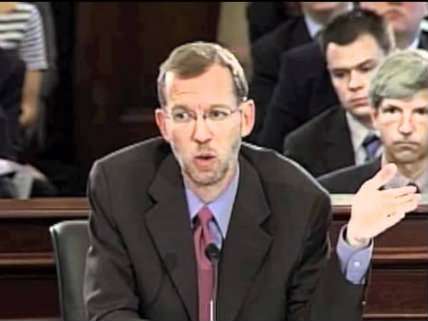Republicans to Pick New Congressional Budget Office Director

Congressional Republicans will pick a new Congressional Budget Office (CBO) director when current CBO chief Douglas Elmendorf's current term is up next year, according to a report by Bloomberg Politics' Dave Weigel.
I was critical of the way CBO's scores were used over the years, but overall I thought Elmendorf was a good steward of the institution and a steady hand in a turbulent time. He wasn't a conservative economist in the political sense, but he was to some extent a small-c conservative in the way he ran the agency—unwilling to adopt novel economic theories because of their political convenience, and he was willing to incorporate the best evidence regardless of its potential political implication. In particular, the CBO under Elmendorf was reluctant give Obamacare credit for largely untested savings mechanisms, and later was quite blunt about the limited evidence that many experimental Medicare savings programs would work.
Having taken the majority in both chambers of Congress this fall, Republicans are well within their rights to pick a new budget office director, and there are more than a few potentially qualified candidates who have traditionally aligned with the GOP. I'll be interested to see who gets the nod.
What I hope, however, is that Republicans in Congress don't get too invested in the prospects of radically changing the CBO's budget analysis through dynamic scoring, which deals with economic ripple effects, in particular, the way that tax changes affect growth in the rest of the economy. Dynamic effects are real—policy changes do have complex downstream effects on economic activity—but the CBO has looked at dynamic scoring before, under Republican leadership, and found that the modeled effects are generally very small. And as Bloomberg View's Christopher Flavelle reported earlier this month, several right-leaning former CBO directors remain cool to the idea.
Fundamentally, the push for dynamic scoring is a push to make tax cuts easier without having to worry about making commensurate cuts to government spending. Under the most exaggerated version of the supply side theory, tax cuts encourage so much economic growth that they produce enough additional tax revenue to pay for themselves all or most of the time, thus resulting in no impact on the deficit. In fact, this is rarely if ever true, and would almost certainly not be the case with today's tax rates. If Republicans want to reform the tax code and cut taxes in the process, they should be prepared to do the work of indentifying and making the case for real spending cuts to match instead of holding out hope that dynamic scoring magic from a new CBO director will help them avoid the responsibility.


Show Comments (55)